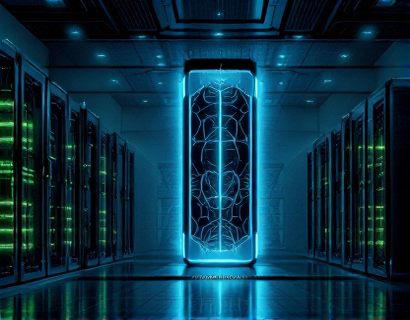Blockchain-Enabled Registry Software: Revolutionizing Data Management with Enhanced Security and Efficiency
In the rapidly evolving landscape of data management, the integration of blockchain technology has emerged as a transformative force, offering unprecedented levels of security, transparency, and efficiency. This article delves into the realm of blockchain-enabled registry software, exploring how it is revolutionizing the way professionals and enthusiasts approach data management, security, and digital transformation. By leveraging the inherent properties of blockchain, such as decentralization, immutability, and cryptographic security, this innovative software is redefining the standards for registry management.
Understanding Blockchain Technology
Before diving into the specifics of blockchain-enabled registry software, it is essential to grasp the fundamental concepts of blockchain technology. At its core, a blockchain is a distributed ledger that records transactions across multiple computers in such a way that the registered transactions cannot be altered retroactively. This technology ensures that once data is recorded, it becomes nearly impossible to modify or delete, providing a high level of data integrity and trust.
Blockchain operates on a peer-to-peer network, where each participant, or node, maintains a copy of the entire ledger. Transactions are grouped into blocks, and each block is linked to the previous one through cryptographic hashes, forming a chain. This linkage ensures that any attempt to alter a block would require changing all subsequent blocks, a task that is computationally infeasible due to the consensus mechanisms in place.
Enhanced Security through Blockchain
One of the most significant advantages of blockchain-enabled registry software is its enhanced security features. Traditional registry systems are often centralized, making them vulnerable to cyber attacks, data breaches, and unauthorized access. In contrast, blockchain's decentralized nature distributes the data across a network of nodes, eliminating single points of failure and reducing the risk of security breaches.
Each transaction in a blockchain is encrypted and verified through complex algorithms, ensuring that only authorized parties can access or modify the data. This cryptographic security not only protects the integrity of the data but also ensures compliance with regulatory standards, making it an ideal solution for industries that handle sensitive information such as healthcare, finance, and government.
Transparency and Traceability
Transparency is another cornerstone of blockchain technology, and it plays a crucial role in enhancing the trustworthiness of registry management. In a blockchain-based system, all transactions are recorded in a public ledger that is accessible to all participants. This transparency allows for real-time tracking and verification of data, reducing the potential for fraud and errors.
For instance, in supply chain management, blockchain can provide end-to-end visibility, enabling stakeholders to trace the origin and journey of products. This level of traceability not only enhances accountability but also helps in quickly identifying and addressing issues such as recalls or quality concerns.
Efficiency and Automation
Blockchain-enabled registry software not only improves security and transparency but also significantly enhances operational efficiency. Smart contracts, self-executing contracts with the terms directly written into code, automate routine tasks and reduce the need for intermediaries. This automation streamlines processes, reduces manual errors, and accelerates transaction times.
For example, in property registry management, smart contracts can automate the transfer of ownership once certain conditions are met, such as the payment of taxes or the completion of inspections. This not only speeds up the process but also reduces the administrative burden on both the authorities and the parties involved.
Case Studies and Real-World Applications
The potential of blockchain-enabled registry software is being realized across various sectors. In the land registry sector, countries like Estonia and Georgia have implemented blockchain-based systems to secure property records, reducing fraud and improving access to property information. These systems have demonstrated significant reductions in administrative costs and increased public trust in the registry process.
In the healthcare industry, blockchain-enabled patient records ensure that medical information is securely and efficiently shared among healthcare providers, enhancing patient care and reducing the risk of data breaches. Similarly, in the financial sector, blockchain-based registry systems facilitate faster and more secure transactions, reducing the need for paper-based processes and minimizing the risk of fraud.
Challenges and Considerations
While the benefits of blockchain-enabled registry software are clear, there are several challenges and considerations that organizations must address when implementing such solutions. One of the primary challenges is the scalability of blockchain networks. Traditional blockchain platforms can struggle with high transaction volumes, leading to slower processing times and increased costs.
To overcome this, many blockchain solutions are adopting layer 2 protocols and sharding techniques to enhance scalability without compromising security. Additionally, the regulatory landscape for blockchain technology is still evolving, and organizations must navigate varying legal requirements and ensure compliance with data protection laws such as GDPR.
Future Trends and Innovations
The future of blockchain-enabled registry software is promising, with ongoing innovations set to address current challenges and expand its applications. Interoperability between different blockchain platforms is becoming a focal point, enabling seamless data exchange and integration across various systems. This will be crucial for creating a more connected and efficient digital ecosystem.
Furthermore, the integration of artificial intelligence and machine learning with blockchain technology holds the potential to enhance data analysis and decision-making processes. By leveraging these advanced technologies, organizations can gain deeper insights from their data, further optimizing their operations and services.
Conclusion
Blockchain-enabled registry software represents a significant leap forward in data management, offering enhanced security, transparency, and efficiency. As organizations across various industries continue to adopt this technology, the benefits of blockchain are becoming increasingly evident. Whether it's securing property records, streamlining healthcare data, or optimizing financial transactions, blockchain-enabled registry software is poised to transform the way we manage and trust data in the digital age.










































